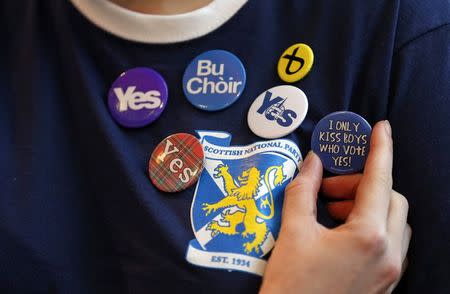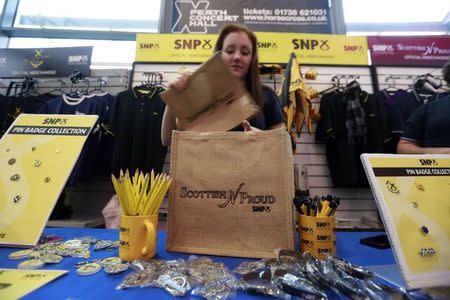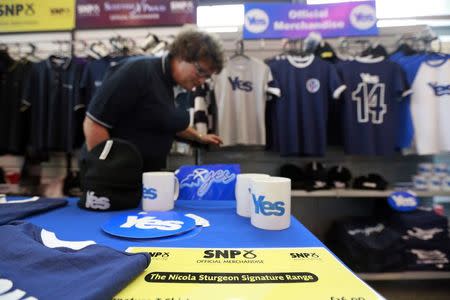Scottish nationalist 'kingmakers' eye post-2015 election deal with Labour
By Guy Faulconbridge and Alistair Smout PERTH Scotland (Reuters) - If Scottish nationalists win a 'kingmaker' position in Britain's May 2015 election, they would consider supporting a minority Labour government but would never get into bed with the Conservatives, their leader in the London parliament said. Since Scots voted by 55-45 percent to preserve the United Kingdom in a Sept. 18 referendum, support for the Scottish National Party has surged on a perception that Britain's rulers are backsliding on pledges to grant more powers. A poll by Ipsos-MORI last month showed the SNP, which won just six seats in the House of Commons in 2010, could win 54 of the 59 Scottish seats in 2015, potentially making it Britain's third largest party in terms of Westminster seats. The once fringe party could find itself a possible 'kingmaker' after the May 7 general election with the fate of the world's sixth largest economy in its hands. "I would relish the opportunity to be able to ensure that Scotland is not governed by Tories that we didn't elect. The SNP will never support a Tory government," Angus Robertson, the Westminster SNP leader told Reuters in an interview in Perth, 450 miles (725 km) north of London. "We will not go into an arrangement with the Tories (Prime Minister David Cameron's Conservatives). That means that other constellations are possible." He said the SNP would consider a deal with Labour and possibly even the Liberal Democrats. The SNP's rise adds a further dose of volatility to the most uncertain general election in a generation as Britain's rulers attempt to tinker with their European Union membership and face a surge of voter disaffection with established parties. Under scenarios currently being discussed, the SNP could enter a 'confidence and supply' deal giving a minority Labour government support on crucial votes in exchange for concessions. So what is the pound of flesh? "I have very high opinion of Reuters but you wouldn't expect me to rehearse our position now," Robertson, a 45-year-old former journalist, said with a smile. After no single party won an overall majority in the 2010 election, Labour ministers dismissed a mooted alliance with Scottish nationalists. Cameron's Conservative Party formed a government with the Liberal Democrats. At the very minimum, the SNP would hold the Westminster parties to their pre-referendum pledge to grant more powers to Scotland. Britain's London-based politicians have bickered over the details, though party leaders insist they will grant the promised powers to Scots. Legislation granting the powers is due to be passed after the election. 'BREXIT, SCOXIT' Scotland may seek another independence vote if Britain's rulers fail to honour their pledge to grant these further powers, outgoing Scottish National Party leader Alex Salmond warned on Friday. "I believe there will be another independence referendum when there is a demand for it," Robertson said. "It is the public that will make these decisions. The people will decide." One route to Scottish independence may be via a possible 2017 referendum which Cameron has promised as a vote on European Union membership. A so called 'Brexit' referendum is dependent on Cameron forming a government in May. Salmond's protege, incoming Scottish First Minister Nicola Sturgeon, has called for Scotland to have a veto over a future referendum on EU membership. That creates the potential for a constitutional crisis that could crack apart the United Kingdom if Scotland voted to stay inside the EU but the rest of the United Kingdom voted to leave, Robertson said. "It would force the biggest constitution crisis in living memory," he said. "I am not sure whether the upper echelons of the political parties in Westminster fully understand that yet. But they are treading on very dangerous ground." (Editing by Stephen Powell)



